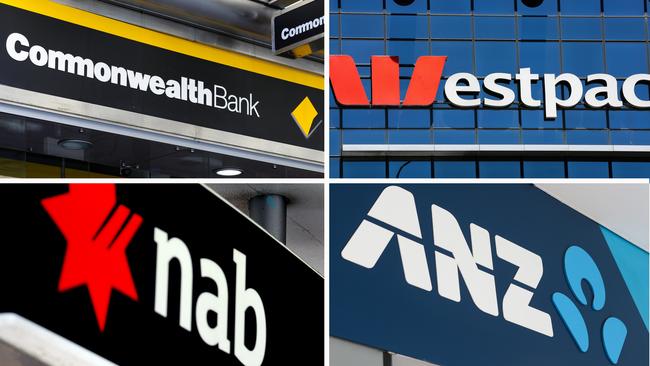How bank shares stack up against the stockmarket over two decades
Bank shares have been a mainstay of Aussie investment portfolios for decades, but only one of the major banks is a true winner.
There’s a long-running saying among investment experts that rather than put your money in a bank account, you should buy the bank.
It’s proven pretty accurate over the years, especially with Reserve Bank interest rates sitting stubbornly low for many years before 2022’s super spike higher.
But looking forward, given the potential for a global recession in 2023, buying into banks may not be the best idea right now.
And looking back, only one of the big four banks – the Commonwealth Bank – has outperformed the overall Australian stock market in the past 20 years.
The All Ordinaries index measuring the nation’s 500 biggest listed companies has climbed 147 per cent since November 2002, not including dividends. In that same 20-year period, we’ve seen:
• Commonwealth Bank’s share price almost quadruple in value, up by 292 per cent.
• Westpac shares rise 75 per cent, about half as much as the overall market.
• ANZ shares rise just 28 per cent.
• NAB’s share price end up almost exactly where it was in November 2002, around $31.

Those bank returns don’t include dividends either, and banks typically pay higher dividends than the broader share market – one of the reasons they’ve been popular among mum-and-dad investors.
However, the dividends do not outweigh the benefits bank shareholders could have gained from investing more broadly in the past two decades.
Reports released last week by financial services and accounting giants KPMG and PwC noted the banks’ strong recent business performances but warned of tougher times in 2023.
PwC says the banks’ recent profit reporting season was the best since 2018, but says looming challenges include falling house prices and other asset values, shrinking demand for loans, plus labour and energy issues.
“It’s inevitable that rising repayments will cause stress for some customers,” said PwC banking and capital markets leader Sam Garland.
KPMG expects mortgage stress to rise in the months ahead as $237 billion of low fixed rate loans switch to much higher interest rates.
It says Reserve Bank rate rises are introducing inflationary pressure on banks’ efforts to cut their own costs and contributing to a potential economic slowdown and rising bad debts.
This potential gloom comes as CBA and NAB are already ranked as the two most expensive banks in the world based on analyst’ valuations using price-to-earnings ratios.
Big banks are proven stayers, and their healthy dividends are expected to keep flowing.

News Corp commentator Terry McCrann noted last week that banks will have built-in profit boosters next year as a large chunk of home loan customers come off ultra-low fixed interest rates and onto much higher rates.
Despite their relatively lower long-term returns, banks have beaten off competition. They shrugged off the cryptocurrency boom, which some investors believed would make regular money obsolete but has only served to show that booms built from thin air eventually become busts.
They also outlasted the rise of Aussie neobanks, digital-only banks that appeared in 2018 but have since largely disappeared. Remember Volt, Xinja and 86 400? They’ve been shut down or bought out.
I would never suggest long-term investors sell out of their big bank shares, which still provide a solid income with great tax benefits for investors and super fund members.
Just don’t bank on them beating the overall stockmarket.






To join the conversation, please log in. Don't have an account? Register
Join the conversation, you are commenting as Logout